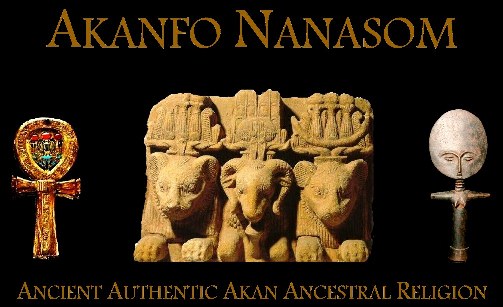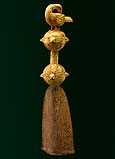AKWASIDAE/AWUSIDAE and AWUKUDAE
Akanfo (Akan people) utilize a calendar system which is comprised of 9 cycles of 42 days. The 42-day cycles are called adaduanan. Within each of the 9 adaduanan or 42-day cycles are two days which many Akanfo recognize as sacred to the Nananom Nsamanfo (Honored Ancestresses and Ancestors) and the Abosom (the Goddesses and Gods/Divine Spirit-Forces of Nature). These two days have the suffix 'adae' attached to them: Akwasi-adae (Akwasidae or Sunday adae also Awusidae) and Awuku-adae (Awukudae or Wednesday adae). Adae is a term meaning 'to sleep' or 'a resting period'. Akwasidae/Awusidae and Awukudae are points within the 42-day adaduanan cycle where time is ritually suspended. We take a "rest" from the physical world and focus our consciousness and energy in the Ancestral Realm that we may be nourished and regenerated therefrom. When we "awaken" from our spiritual rest, we are refreshed and re-tooled to carry out our nkrabea---our Divinely alloted function (mis-conceptualized as "destiny") in Creation.
Food offerings are given to our Nananom Nsamanfo at the nkommere (shrine) and other rituals are performed on these sacred days, all of which function to re-commit us to the Divinely ordered guidance regularly transmitted to us by our Nananom Nsamanfo. The various means by which Akanfo observe Akwasidae and Awukudae is based on the relationship we have cultivated with our Nananom Nsamanfo and the Abosom connected to us.
No non-Afurakani/non-Afuraitkaitnit (non-African/non-Black) individual or group can be part of nor participate in an adae observance, nor any other Afurakani/Afuraitkaitnit (African) Ancestral Religious observance for that matter.
Below is a list of the upcoming Akwasidae and Awukudae dates for the year 13025 (2025).
Note: The New Year actually begins in the gregorian calendar month of September for Aakhuamuman Amaruka Atifi Mu (Aakhuamu Nation in North America). Most Akanfo celebrate the New Year at some point during the gregorian calendar months of August, September or October. Only with the advent of the corruption of our culture by the whites and their offspring did some Afurakanu/Afuraitkaitnut (Africans) begin the foolish practice of claiming that the New Year begins months later in the dead of winter on January 1.
The gregorian calendar date of September 22, 2024 (the first full day of the autumn equinox) is actually the first day of the year 13025. This means that the last day of 13024 is the gregorian calendar date of September 21, 2024. The following day, September 22nd, is therefore the first day of the New Year 13025 (2025) for Aakhuamuman Amaruka Atifi Mu, 100 days prior to the gregorian calendar date of january 1.
Afurakanu/Afuraitkaitnut do not base our observance of time on a fictional character from the pseudo(fake)-religions of the whites and their offspring. The cycle we adhere to is the Afe Kesee (Great Year) which is the cycle wherein the equinotical point of Owia (the Sun) takes approximately 26,000 years to move through all of the constellations (so-called zodiacal signs) which cross the ecliptic. We are in the midst of the present-day Afe Kesee, hence the years beginning with 13000.
Food offerings are given to our Nananom Nsamanfo at the nkommere (shrine) and other rituals are performed on these sacred days, all of which function to re-commit us to the Divinely ordered guidance regularly transmitted to us by our Nananom Nsamanfo. The various means by which Akanfo observe Akwasidae and Awukudae is based on the relationship we have cultivated with our Nananom Nsamanfo and the Abosom connected to us.
No non-Afurakani/non-Afuraitkaitnit (non-African/non-Black) individual or group can be part of nor participate in an adae observance, nor any other Afurakani/Afuraitkaitnit (African) Ancestral Religious observance for that matter.
Below is a list of the upcoming Akwasidae and Awukudae dates for the year 13025 (2025).
Note: The New Year actually begins in the gregorian calendar month of September for Aakhuamuman Amaruka Atifi Mu (Aakhuamu Nation in North America). Most Akanfo celebrate the New Year at some point during the gregorian calendar months of August, September or October. Only with the advent of the corruption of our culture by the whites and their offspring did some Afurakanu/Afuraitkaitnut (Africans) begin the foolish practice of claiming that the New Year begins months later in the dead of winter on January 1.
The gregorian calendar date of September 22, 2024 (the first full day of the autumn equinox) is actually the first day of the year 13025. This means that the last day of 13024 is the gregorian calendar date of September 21, 2024. The following day, September 22nd, is therefore the first day of the New Year 13025 (2025) for Aakhuamuman Amaruka Atifi Mu, 100 days prior to the gregorian calendar date of january 1.
Afurakanu/Afuraitkaitnut do not base our observance of time on a fictional character from the pseudo(fake)-religions of the whites and their offspring. The cycle we adhere to is the Afe Kesee (Great Year) which is the cycle wherein the equinotical point of Owia (the Sun) takes approximately 26,000 years to move through all of the constellations (so-called zodiacal signs) which cross the ecliptic. We are in the midst of the present-day Afe Kesee, hence the years beginning with 13000.
AKWASIDAE/AWUSIDAE
(gregorian calendar dates: September 21, 13024 (2024) - September 22, 13025 (2025))
October 27
December 8
January 19
March 2
April 13
May 25
July 6
August 17
AWUKUDAE
October 9
November 20
January 1
February 12
March 26
May 7
June 18
July 30
September 10
See: Apoo and Obra Dwira Nananomsom


SAN
(return)